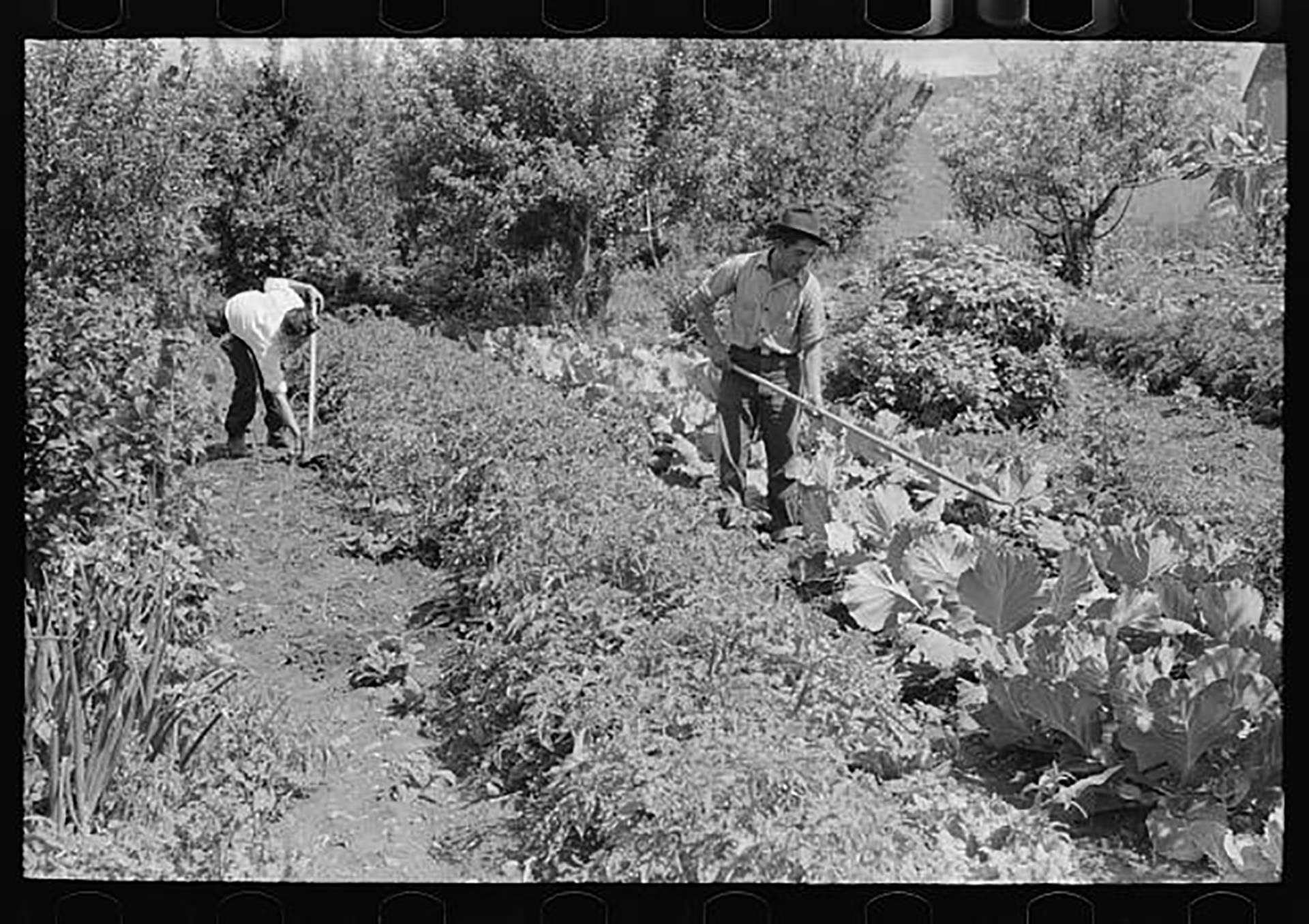An agrarian path forward
May 12, 2021
 Retrieved from the Library of Congress, https://www.loc.gov/item/2017742752/
Retrieved from the Library of Congress, https://www.loc.gov/item/2017742752/
Chamisal, New Mexico, farmers tend to vegetables in this July 1940 Lee Russell photograph.
Rebuilding an agricultural rural economy: NIFA awards grant to
UNM-Taos’ new workforce, training program
Taos, New Mexico – The mountainous region of Northern New Mexico is a land of contrasts, where the landscape runs from the high desert and canyons of the Río Grande Valley to the fertile upland meadows and massive peaks of the southern Rockies. The population is spread out, but the many small rural communities have a strong and abiding sense of place. Taos, which many consider to be the heart of the Northern New Mexico region, is a rural community that celebrates tradition while struggling to embrace change that will address systemic problems of poverty and unemployment that are nearing crisis.
Overall income statistics for Taos County are some of the lowest in the nation. Jobs are scarce because industry and manufacturing are non-existent, and the use of advanced technologies is limited.
Not Forgotten Outreach, Inc. (NFO) was the first voice to approach UNM-Taos about the possibility of offering an agricultural program. NFO originally partnered with the UNM-Taos Construction Technology program in 2014 to train military families in agriculture. That program became the catalyst for NFO to develop a strong agriculture training curriculum, which they hoped would become a certified educational program.
The culminating new project, Rebuilding an Agricultural Rural Economy (RARE): Rural Community Agriculture Workforce and Training Program, was recently awarded a $500,000 Agricultural Workforce Training grant from the U.S. Department of Agriculture’s National Institute of Food and Agriculture (NIFA) research initiative.
Framed by a dearth of regional large-scale agriculture in Northern New Mexico, and supported by the Taos Valley’s foundation in the centuries-old practice of farming using acequias (manmade communal water courses diverted from natural tributaries), UNM-Taos and UNM-Taos HIVE (Hub of Internet-Based Vocations and Education) are partnering with NFO and the Taos County Economic Development Corporation (TCEDC) to create the RARE workforce training certificate program, which will support the local food and small-scale farming economy in Taos.
“The recent development of the HIVE program and its focus on economic development, as well as the economic focus of NIFA, seemed to provide a natural fit to include other topics of study into the program,” stated Louis Moya, J.D. UNM-Taos director of development. “And we refined the more general concept of including agricultural curriculum and are including economic/business skills in the program. It, then, was natural to consider the necessity of including cultural elements.”
The RARE program will train two separate cohorts of 15 student participants (30 total prospective farmers, ranchers and food producers, recruited from underserved and veteran populations) through an immersive curriculum of farming practices, safe and healthy food production, and the small business/entrepreneurial skills required to create and enhance local industry, and the next generation of small-scale sustainable farmers, ranchers and food producers in Northern New Mexico.
The part-time curriculum is 18 total credit-hours offered over 12 months (Spring, Summer and Fall semesters beginning July 1, 2021, through June 30, 2024) that provides industry-recognized stackable certifications; a focus in traditional, sustainable and drought-condition farming methods; as well as entrepreneurial training from small business professionals and innovation experts at UNM-Taos HIVE, and commercial and industrial food producers at the TCEDC’s commercial kitchen with opportunities for internship and apprenticeship at local farm sites or food-based businesses. Participants will receive a technical certification allowing for entry into a modern, rural agrarian economy through employment or entrepreneurship.
The path forward is not through an industrial and mechanistic approach to create a farming industry but, rather, through communal small-scale, unit-centered farming — like what was done in the region’s antiquity — which will create a path forward.
“I think the integration of the other aspects of the curriculum (entrepreneurship/cultural studies) came as we developed our strategy for creating an economically oriented program (and certification) and our approach to an application,” Moya said.
The Agricultural Workforce training grant will provide the community with community college students who possess the skills and tools necessary to secure industry-accepted credentials to join the workforce.
“Community colleges provide significant workforce development nationwide,” said NIFA Director Dr. Carrie Castille. “These awards will help students earn a two-year degree or an industry-accepted credential that will create better job opportunities and fuel the talent pipeline needed in the food and agricultural sector.”
Other organizations involved in the project are Taos Land Trust, Alianza-Agricultura, Taos Valley Acequia Association, Taos Entrepreneurial Network and Taos Community Foundation. UNM-Taos program co-coordinators are Moya, and Professional Skills and Community Engagement Dept. Chair Victoria Santistevan Gonzales. “This program is a dream come true for me,” Santistevan Gonzales said. “As a product of a farming and ranching family, keeping our land-standing tradition of working our lands and self-sustainability is important, and we are responsible for passing this knowledge on.”
“By partnering with RARE, we become one step closer and enable NFO to include more Taosños into the farming activities at Not Forgotten Outreach’s 28-acre farm/ranch training location,” said Yani Bunch, NFO executive director. “This collaboration facilitates the reintegration of our veterans and their military families. We're very happy to be a part of this grant, and we think it will be a great opportunity for Northern New Mexico agriculture."
“For this program,” Moya added, “we have had to and will have to further refine the structure of the program as we contemplate implementation post-award, as capacity and partnership considerations will sometimes require some evolution from the original concept. However, sticking to the proposed directives of the grant and the funding is a necessity.”
NIFA invests in and advances agricultural research, education, and extension across the nation to make transformative discoveries that solve societal challenges. NIFA supports initiatives that ensure the long-term viability of agriculture and applies an integrated approach to ensure that groundbreaking discoveries in agriculture-related sciences and technologies reach the people who can put them into practice. In FY2020, NIFA’s total investment was $1.95 billion.
To learn more about NIFA’s impact on agricultural science (searchable by state or keyword), visit nifa.usda.gov/impacts.
